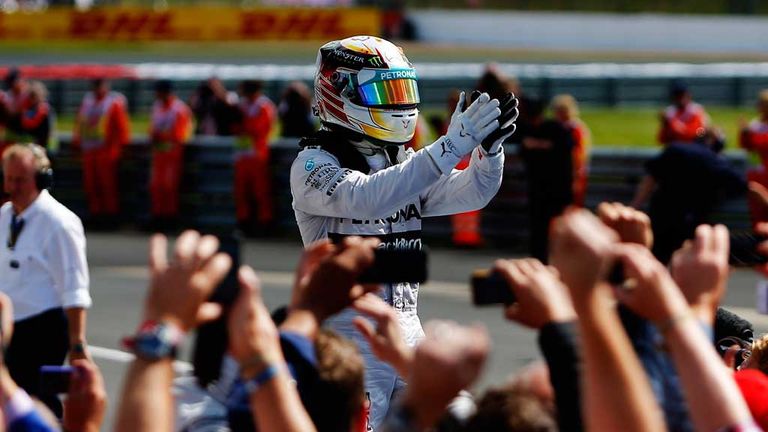Analysing Lewis Hamilton's British GP perfect timing
Sky Sports F1's Mark Hughes considers Lewis Hamilton's perfect timing in the British GP and if his successful pit-stop call may trigger a change in his approach
Thursday 9 July 2015 16:32, UK
Lewis Hamilton's call to pit on lap 43, just before rain arrived to coat the whole circuit, sealed him his British Grand Prix victory.
Hamilton's motivation for pitting was that his tyres were finished, Rosberg was catching fast and looked certain to pass him on the next lap. This would then have given Rosberg strategic priority as to who stopped first - almost guaranteeing a Rosberg victory.
Hamilton was hoping that the rain would arrive soon after he pitted - and was encouraged by the blackness of the clouds he was seeing as he came down Hangar Straight. As he said afterwards, "For the first time in my whole F1 career, I made the perfectly right choice in coming in [when I did]. I could see the rain was coming and I’ve never had that before."
Yes, he made the call, yes he did so informed by his own eyes of how black the clouds were and yes it turned out to be the perfect call - for almost at the precise moment the intermediates were fitted to his Mercedes the heavens opened. But he was pressured into taking that initiative only because he was about to lose the lead to Rosberg.
Had he been circulating with a big lead and no-one catching him, would he have taken the decision to pit at that precise moment - when it looked far from certain that the rain would be arriving on this lap rather than the next, or even five laps later? There would have been no reason to take that gamble. It was Rosberg catching at two seconds per lap that forced Hamilton to make a decision - and he took the only logical one that was available to him for he was almost certain to lose the race if he stayed out long enough for Rosberg to pass him, which he would surely have done on lap 44.
Hamilton famously lost the chance to take the 2007 world championship in his rookie year by not pitting earlier at the Chinese Grand Prix, through waiting to be told to do so by the team rather than simply telling them he was coming in. That day back in 2007 McLaren was trying to delay the decision so as to understand what the weather was about to do, so as to know if slicks or intermediates would be the best choice - but for every lap it deferred that decision Hamilton’s rear tyres were getting into an ever-more desperate state.
Hamilton should have been the one to first understand that the luxury of that deferral was not available - and to have taken it out of their hands by taking the initiative. Instead he infamously ended up in the pitlane gravel trap, with his down-to-the-canvas tyres unable to even get him round the pit road’s left-hand turn.
In Australia 2010, Jenson Button showed McLaren what in-cockpit leadership was when he made the call in the early laps of Melbourne to change from inters to slicks. The extra two laps Hamilton waited to be called in lost him that race to Button.
Although Hamilton has made calls of his own even before Silverstone on Sunday, as a generality he is one of the less proactive. Button, Sebastian Vettel, Fernando Alonso and - in the past - Robert Kubica were always much more likely to take the decision out of the team’s hands if they felt they knew better. It’s a very delicate balancing act; in some situations the team has a much fuller picture of the crucial pieces of information than the driver can possibly have. Other times the team’s detailed data on gaps and deltas is less relevant and the situation so fluid on track that the driver actually has a much better perspective than the team. Sunday was one such occasion.
Throughout Hamilton’s racing career, from karting onwards his massive talent has been the decisive factor in his success. For him, the fewer random variables that are thrown in the better - as he feels that with a competitive machine he can take care of the rest. Has this led perhaps to a less developed sense of ambush and opportunity than in some others? If so, it’s an area of potential improvement he could target as he refines his game.
Was that lap 43 decision at Silverstone indicative of someone who is developing that skill? There’s little to suggest it was. He made an informed decision, and it was the right one - but it was forced upon him. The alternative was near-certain defeat.
But, now he knows what it is to feel the satisfaction of his initiative having been the deciding factor in victory, is it a skill he will now become more confident in utilising?
MH





